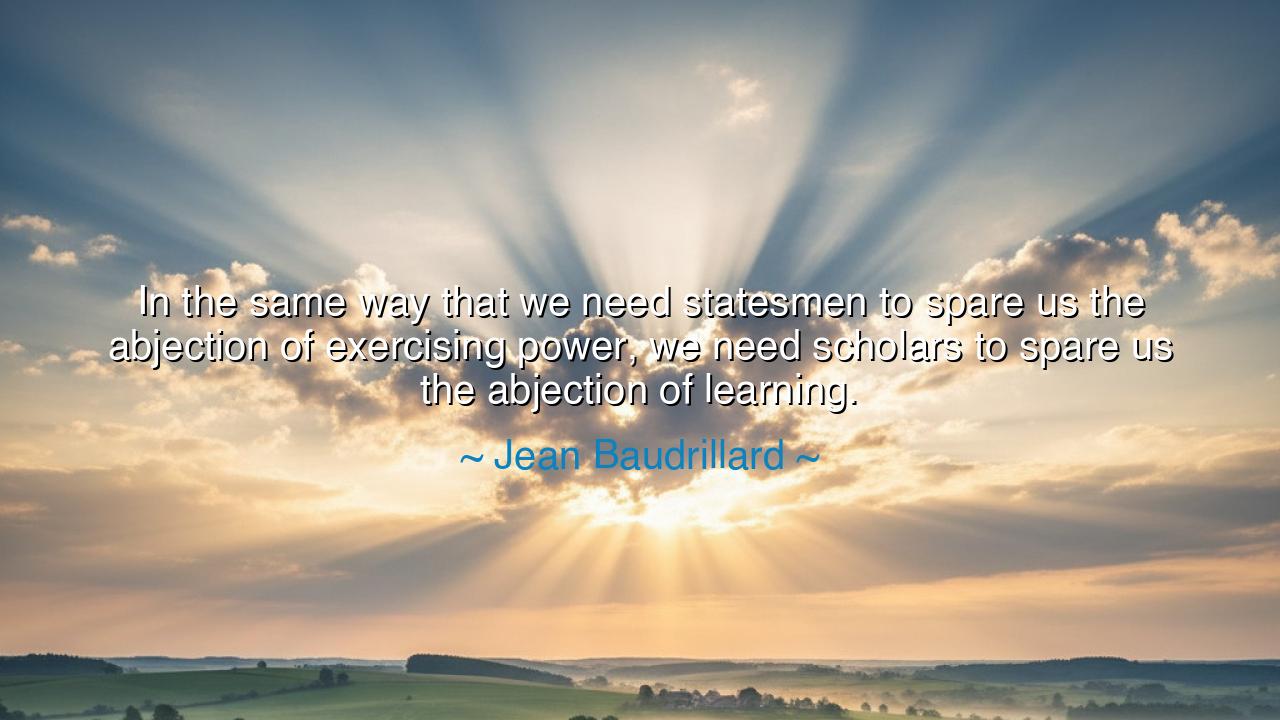
In the same way that we need statesmen to spare us the abjection
In the same way that we need statesmen to spare us the abjection of exercising power, we need scholars to spare us the abjection of learning.






In the enigmatic and piercing words of Jean Baudrillard, the philosopher of mirrors and meanings, we encounter a truth that shimmers like a blade in moonlight: “In the same way that we need statesmen to spare us the abjection of exercising power, we need scholars to spare us the abjection of learning.” Here, Baudrillard speaks to the burden of knowledge and the weight of power, two forces that define the human condition. He reminds us that both ruling and learning—though noble in essence—can degrade the spirit when stripped of wisdom and purpose. Power, without virtue, becomes tyranny; learning, without reflection, becomes slavery to information. Thus, he calls upon the statesman and the scholar to act as intermediaries between humanity and its own chaos—to redeem the necessary acts of control and understanding from their baser forms.
To grasp the depth of this thought, one must first understand the abjection Baudrillard speaks of—the deep weariness, even disgust, that comes when human endeavors lose their soul. The exercise of power, he says, can corrupt the heart, for it tempts man to domination and pride. Likewise, the pursuit of knowledge can ensnare the mind, when it becomes accumulation without insight, learning without transformation. Just as we need the statesman to transform power into governance and order, we need the scholar to transform knowledge into wisdom and meaning. Without them, civilization would collapse under its own excess—too much force, too much information, too little understanding.
Baudrillard’s insight comes from the modern age, when knowledge has grown vast but shallow, and information multiplies faster than truth. In ancient times, to learn was a sacred act, a pilgrimage of the soul. The philosopher sought not to consume facts, but to purify the mind and perceive the harmony of the cosmos. But in our time, learning has become endless and restless—a flood of data without reflection. We are drowning in knowledge, yet thirsting for understanding. The scholar, in Baudrillard’s vision, is not merely a collector of ideas, but a guardian of meaning, one who interprets the flood and gives it form, sparing humanity from the despair of empty learning.
Consider the figure of Socrates, the Athenian sage who never claimed to know, yet taught the world how to think. In the bustling agora of Athens, surrounded by men proud of their rhetoric and logic, Socrates stood as the true scholar, guiding others to wisdom by teaching them to question themselves. He did not hoard knowledge, but refined it through dialogue; he did not exalt learning for its own sake, but sought its moral and spiritual essence. In his humility, he spared his people the abjection of learning—the vanity of intellect without virtue. He showed that true scholarship is not about knowing all things, but about knowing oneself, and through that, knowing truth.
Similarly, the statesman, as Baudrillard describes, is the one who bears the burden of power on behalf of others. In his hands, the chaos of force becomes law, and ambition is tempered by duty. Without such figures, power would fragment into violence, just as knowledge without scholars disintegrates into confusion. History offers us examples of both—the noble leader who governs with restraint, and the tyrant who succumbs to the intoxication of control. The true statesman, like the true scholar, is one who transforms necessity into virtue, who disciplines human will with wisdom.
Baudrillard’s message, though cloaked in irony, is a plea for balance—a return to the harmony between knowing and being, governing and serving. In his view, both learning and power become noble only when filtered through the consciousness of those who understand their danger. The scholar’s duty is not to collect truths, but to interpret them; not to dominate knowledge, but to elevate it. Likewise, the statesman’s duty is not to wield power for conquest, but to channel it toward justice and peace. In both, the calling is the same: to spare humanity from itself.
So, O seeker of wisdom, take this teaching to heart. Do not pursue knowledge as possession, but as pilgrimage. Let your learning refine your soul, not inflate your pride. And when you encounter power—whether in governance, leadership, or influence—remember that it, too, is a sacred trust. The abjection of learning comes when we study without wonder; the abjection of power, when we rule without conscience. To avoid both, one must learn as Socrates did—with humility—and act as the true statesman—with duty.
In the end, Baudrillard’s words echo the wisdom of all ages: that knowledge and power, when divorced from virtue, degrade the human spirit. But when guided by wisdom, they become instruments of harmony. Be therefore your own scholar and your own statesman—discipline your learning with reflection, and your will with compassion. In doing so, you will not only understand the world—you will elevate it.






AAdministratorAdministrator
Welcome, honored guests. Please leave a comment, we will respond soon